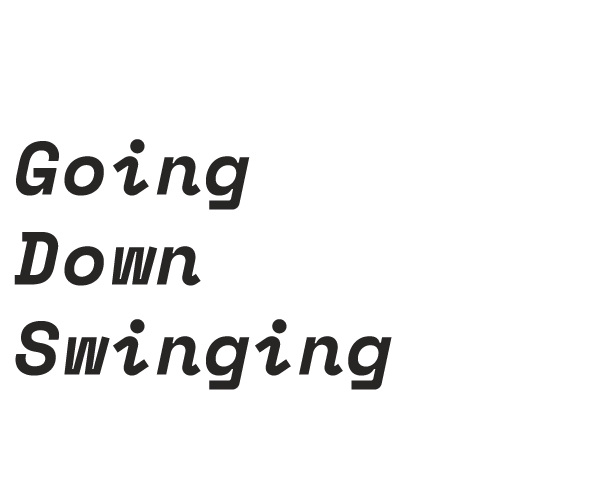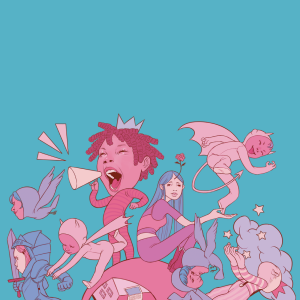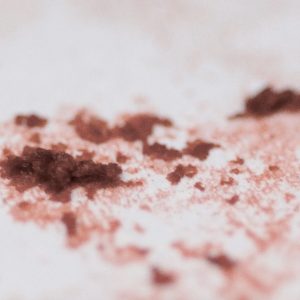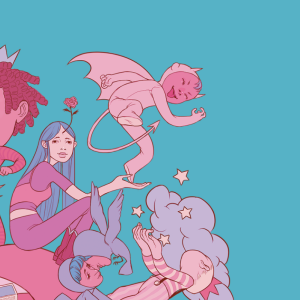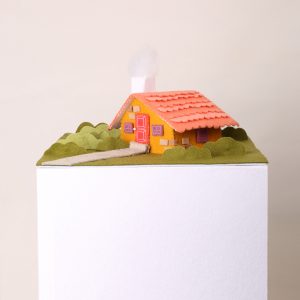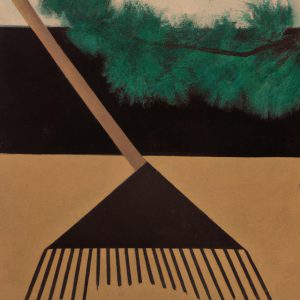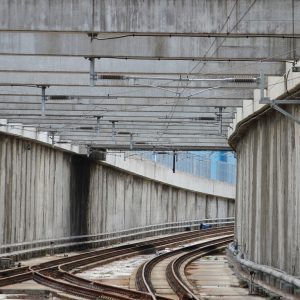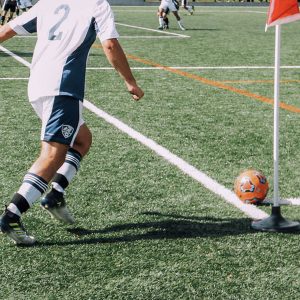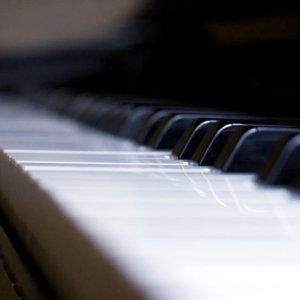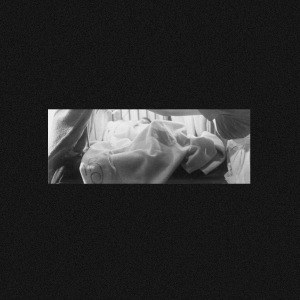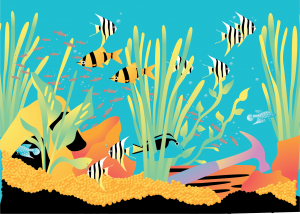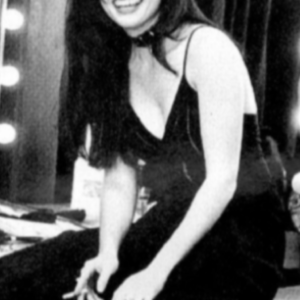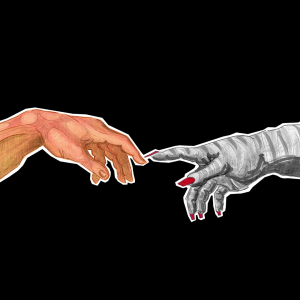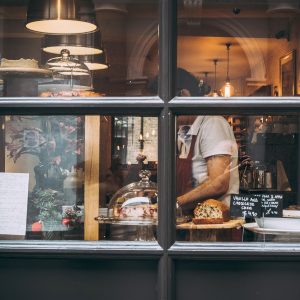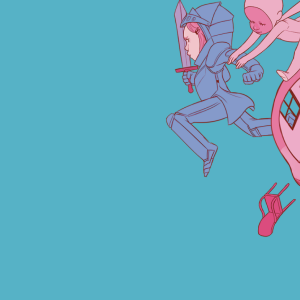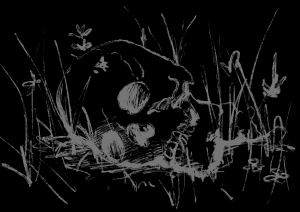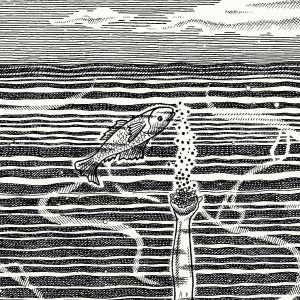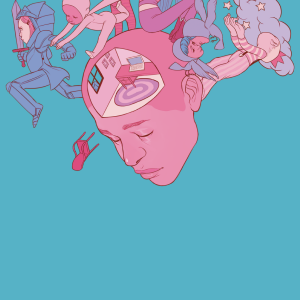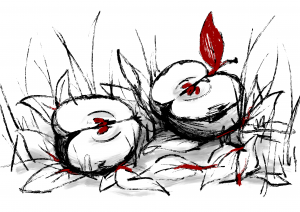After my graveyard shift at the hospital, I got home and slid onto the bed next to Miryam, her eyelids fluttering. I wondered what she was dreaming about. For a while I scrolled down the abyss of social media, but there was no one online. I fell asleep with the phone in my hand.
I slept well into the afternoon. In the evening, I drew the curtains and caught the bus to the café where Miryam worked. They’d recently installed a new window, allowing passers-by to see the churros being made in the kitchen, which was bisected from the service and dining areas by a plexiglass barrier. I watched Miryam grimacing over a vat of simmering oil, turning a handle to eke out the pastry from the churning machine. She tied the soft, floury cord into a V shape and then broke it in two like a wishbone. A fist of batter was rising on the bench, the gleaming steel surface pounded with flour and sweat. The café adjacent swarmed with people eating and drinking while the hot oil danced inches beneath Miryam’s fingers.
Staring at the droplets of fat clinging to the window, for a moment I felt like I might cry. When we first started dating, Miryam used to bring me greasy paper bags of churros swaddled in serviettes. That was years ago, way back when you had to carry gleaming notes and cards in your wallet or install them on your phone. After the pandemic, if you were on social security, you had to pay for everything through the Indue card. It was easier in some ways, but every transaction was tracked through your government ID – that made us a little bit uneasy.
At first we tried to avoid the card. Miryam was suspicious of everything the government did, after everything her father had been through in Xinjiang during the 20s. When the council announced that Perth would become a SmartCity, she called me at work during her lunch break. “I can’t imagine why they would install technology adapted from Jinping’s credit system,” she groaned.
“Are you serious?” I asked. “What the fuck even is a SmartCity, anyway?’
She explained to me that the prototype for the SmartCity design was borrowed from the social credit system in China’s northwest province, where her dad was born. Apparently, Perth’s system used similar technology to the SmartCity that was rolled out in Darwin in 2020, installing public wifi points to monitor citizens’ movements through their phone signal and data footprint. The police found it a lot easier to track petty criminals that way.
Miryam was new to working at the council then, so she didn’t want to kick up any fuss. But she was worried. The council were under a lot of pressure to find revenue, as the resources industry was still digging itself out of the economic hole left by the pandemic. Behavioural futures markets were booming. The council would be able to sell the excess monitoring data to private companies, while providing surveillance for street crime. There was no point even arguing, Miryam said. It was just progress.
That was back when small things first started to change. It had seemed logical at first. In order to save electricity, the council had started turning off the streetlights in the outer suburbs, with sensors ensuring that only verified presences would receive light. Then geofences were put up, virtual barriers that sent out an alert to authorities if citizens broke curfew – new travel limitations would restrict movement between 9.00 p.m. and 5.00 a.m. between the inner-city limits and outer suburbs. Safety precautions, the council explained.
As I looked through the shop window at Miryam I smiled. She sighed and punched the dough into shape, frowning. I realised it must be one-way glass.
That night, Miryam and I decided to break the new geofencing laws. My nonno had passed away a few years ago, and we’d made a habit of driving out to Bunbury to lay flowers at his grave.
Gino had fought to remain independent until the last breath. “You’ll have to shoot me before I go into a nursing home,” he said half-jokingly, when I suggested getting an assisted living arrangement. Not that we had the money for a carer anyway, once I’d lost my job.
As we drove along the Forrest highway, Miryam and I talked about our families. My grandparents had panicked during the outbreak, not so much about contracting the virus, but being left behind in the scramble as jobs and essential items flew off the shelves.
It had been my job at the community legal centre to advocate for seniors in Perth, who were treated largely as if they were invisible. I remember volunteers telling me about people they’d met who hadn’t spoken to anybody else for whole weeks. I scheduled social media posts asking families to check on their elderly relatives, lobbied supermarket chains to keep aside a special hour for seniors, campaigned for an increase to the disability support pension. One day I had a particularly disheartening meeting with an MP who agreed we needed to take care of the elderly, but said that the government needed “to prioritise the health of the economy for future generations.” A few weeks later, I heard our funding had been cut. My contract had expired.
Miryam had been sympathetic but unruffled. It was her thirtieth birthday, and as per usual, she’d refused to celebrate. She skyped her mother while I baked her a passionfruit slice. “Christina won’t have trouble finding another job,” she said, frowning at her laptop screen. She was right; I would get other jobs, in the form of sleepless nights packing at a warehouse and cleaning at the hospital. But the clients from the community legal centre never left my mind.
I remembered Luisa, an elderly woman who passed away during the 2025 heatwave. She lived alone in her tiny apartment at the housing commission block. On her bedroom wall was a collage made by her daughter as a child: the picture had brown lentils glued to it, seeds in the middle of a yellow-petalled flower. I was at the hospital when I found out that she had died. My hands shook when I tried to put my cleaning gloves on – Luisa had been only sixty-eight.
I felt hopeless with frustration. When Miryam was laid off, I told her that I wouldn’t say she would get another job. “Oh my god. I’m fucking sorry,” she said, putting her head in her hands.
Now Miryam worked at the churro café, I felt guilty that I hadn’t been more forthcoming. She sometimes came home with oil burns on her arms. “I’m sorry we have shit jobs now,” I whispered into her ear one night.
“Not your fault,” she said, rubbing ointment into a pocked scar on her forearm.
“I know. But I’m still sorry.”
Miryam put the tube on the bedside table. “Chris, what difference does it make?” She sounded tired. “At least we have jobs.”
When we got to Bunbury, I held Miryam’s hand as we got out of the car at the top of the cemetery. A copse of gum trees sighed in the breeze. Stepping onto the curb, I felt a buzz in my pocket as we ran up against some geofencing. “Piss off,” I said as I blocked the sensor.
Miryam had a contact who helped us install geofence keys in a simple paging coaster, the same kind they use at cafés. The keys were supposedly untraceable, but even then, we couldn’t be sure that someone’s hidden wifi network wouldn’t pick up signals from our phones. There was an ad campaign for a while encouraging people to report suspicious movements with the slogan Keep Watch for WA – A Community Initiative. It reminded me of a story Miryam once told me about her dad. At the gas processing plant where he worked, the operations manager had offered her father money to report on his co-workers, who were Muslim. He declined the bribe, saying he refused to spy on his colleagues. The next weekend he didn’t come home from work.
Her dad was missing for three months. Miryam’s mother said that he was never the same when he got back – he was uneasy at the thought of her going to the markets or the post office, and he would always move his seat in any room to a place where he could see the door.
I turned the word over in my mouth. Community. It was a word that was rinsed and repeated almost to death at a not-for-profit like the legal centre, so much that it had faded from a tangible, tangled mesh of relationships into an abstract, containable target.
I turned the word over in my mouth. Community. It was a word that was rinsed and repeated almost to death at a not-for-profit like the legal centre, so much that it had faded from a tangible, tangled mesh of relationships into an abstract, containable target.
We passed the virtual boundary of the geofence and walked quietly through the weeds, treading gingerly on the gravel path. At the bottom of the hill was Gino’s grave. I rubbed the bird shit from the granite plaque with my thumb and replaced the wilting poppies at his headstone with frangipani. In his hometown they were called pomelia – the flower of Sicily.
“Ciao, Nonno,” I said. “Your brother’s old house is a foot beneath the water now. Marzamemi is nearly completely underwater, the seas have been rising so fast there. Here, too. All the good fishing spots are gone, or you have to get there at low tide. It’s hotter than ever in Perth. I think we might have to move. I don’t want to be away from you, though. I miss you.”
I didn’t cry as I mumbled my newsreel. I missed Nonno a lot – it was weird not being able to talk to him. I used to call him every Sunday and we’d talk for hours. Before he died and he was in hospital, he said he would miss hearing from his granddaughter, so I said he could phone call me from heaven. “Like E.T,” he’d joked. “E.T. phone home?” Sitting down at his grave, I prayed for him as I’d promised Nonna long ago, counting off her rosary beads.
Afterwards, Miryam held my hand as we walked back to the car. I breathed in the tangy scent of the swaying eucalyptus gums. Nearby was a warehouse built on top of what had been a public reserve. I remembered playing in Nonno’s backyard as a child, bouncing on the trampoline and peering over the fence. I often saw Aboriginal families gathered in the park, the kids playing footy and climbing trees.
As Miryam reversed out of the parking space, we looked out for passers-by. I saw a person walking their dog across the road from the town’s only fast food restaurant. We were driving towards the intersection when the car engine suddenly conked out. We stalled at the green light.
“Shit.” Miryam said.
“What’s up? Can’t we restart it?” I said. My heart was racing.
“No, it won’t go,” she said, turning the key in the lock.
The dashboard ticked. I watched the lady with her dog walking towards us and wondered if she had dobbed. Then again, it could have been a streetlight sensor, or even my car insurance company – I hadn’t paid the rego that was due last month.
I reached in my pocket for the paging coaster. It wasn’t picking up anything.
“Pager’s not working,” I said. “They must have deactivated it.”
“Who’s they,” muttered Miryam, pulling the car door open. “Come on, let’s go.” She got out of the car and called out to the dog walker. “Hey, can you help us get this car into the loading bay?”
The lady stopped, pulled airpods out of her ears. “What’s up?” She was a teenager.
“We just got fenced at the intersection. Do you wanna help us out?” Miryam said boldly.
The girl shook her head. “Don’t youse know you’ve gotta disable fencing ’round here?”
I breathed out in relief. “We tried to, but we’ve only got these shit bricks,” I said. I pulled the beeper from my pocket and held it out for her to see.
She snorted. “No wonder youse broke down,” she said. “You gotta download this app.” She tapped her phone, showing us her screen with a wifi icon. A stencil font said FUK THE FASCIST STATE.
“We usually leave our phones at home for this kind of mish,” I explained, embarrassed.
The girl stood shaking her head. Her staffy was taking a piss on one of the sedan’s tyres. “We won’t be able to shift this, just us three,” she said. “My name’s Jodie, by the way.”
“I’m Christina,” I said.
“Miryam,” said my partner. “We’re not really worried about the car so much. It’s a shitbox. Only reason we kept it…” she trailed off, looking at me.
“It’s my nonno’s old car,” I explained.
Jodie shrugged. “Well, it’s up to youse whether I call my boyfriend or not,” she looked over at her dog, who’d started licking Miryam’s hand. “He can help you pull into the loading zone or maybe even get back on the road.”
“Call him,” Miryam said, crouching down to pat the staffy.
As we waited for Jodie’s boyfriend, the girl thumbed at her phone. She had a sleeve of floral tattoos, sunflowers and frangipani blooming along her arm – some of them were raw, while others had healed into raised, dark ridges of tissue. I felt a tender pang of grief.
“Want a hash brown?” Miryam interrupted my thoughts, pointing to the fast food joint. Our comfort food.
“Yeah, alright.” I gulped. She reached out and squeezed my hand.
“I’ll get you one, Jodie?”
“Nah, thanks.”
As Miryam walked over to the restaurant, I patted the staffy. The dog’s neck was tensed, ears pricked up. I watched the counter at the driver-thru window. It suddenly occurred to me that it could have been a server who dobbed us in.
My eyes itched. The future was gaining on us, and we were sick of watching out for it.
